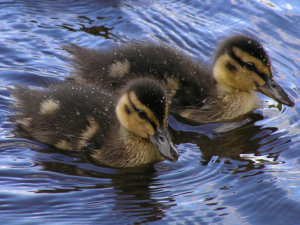Emerging Veterinary Issues
 Sunday, May 1, 2011 at 01:00PM
Sunday, May 1, 2011 at 01:00PM Brought to you by the SAVMA Public Health and Community Outreach Committee (PHCOC). Be sure to check your email for the full recent issue of the PHCOC newsletter, forwarded from your SAVMA Delegates!
As the seasons change and springtime begins across the country, it brings with it wildlife encounters of all kinds. The article below, courtesy of the Wall Street Journal, addresses wildlife rehabber's suggestions on what to do if you (or your friends/roommates/clients) find injured or orphaned wildlife.
What to do when you find animals in your yard
Published in the Wall Street Journal April 20, 2011
http://online.wsj.com/article/AP4d0404a8860e4f76ae5a14a4f944964b.html?mod=dist_smartbrief
ALBANY, N.Y. — Wildlife rehabilitator Joanne Dreeben's phone just keeps ringing this time of year.
It starts in March when her neighbors in New York City's northern suburbs find baby squirrels in their attics. Then come callers who find young pigeons and sparrows on their property, followed by folks who spy song birds on the ground. Finally comes the long summer of rabbits nicked by lawnmowers, sparrows clawed by Tabby, and assorted calls about deer, foxes and raccoons.
"It's always something like, 'My cat brought in this, or my dog injured that, or we took a tree down and didn't realize there was a nest in there.' I would say they're the three most common calls," said Dreeben, of Yonkers, N.Y., who has been nursing wild animals back to health for 30 years. "Most of the people, by the time they get to me, are frustrated: 'This is the 12th call I've made!'"
Countless homeowners will find hobbled or mauled animals on their property this year. It's not always clear what to do. There are differences in how to handle, say, a baby chick versus a frothing raccoon. And it's not always easy to find someone to help.
Just ask Kim Rubin, who found a sickly goose in her Westchester County, N.Y., backyard a couple of months ago.
"I was sort of amazed when I started calling around — it was really hard to find someone to deal with injured wildlife," she said.
Around the country, as suburbs encroach on the woods and fields where animals live, they must travel farther for food. In just the past year, feral hogs have bedeviled parts of rural Arkansas, wild peacocks strutted northwest of Seattle and pesky elk trampled gardens in Kentucky. Last year, police in Oviedo, Fla., killed a wild boar that was charging at locals, and several coyotes even wandered into New York City.
Those headline-grabbing cases are outliers. Far more common are incidents involving cotton-tail rabbits, squirrels and starlings. Most of those animals do not pose a danger. Still, wildlife experts warn, never approach a mammal acting strangely, especially bats, skunks and raccoons, which can contract rabies.
If there's no danger, try to determine if the animal is really injured. Check for bleeding, vomiting or shivering. For instance, it's OK for fledglings to hop around on the ground. It's what they do. Leave the bird alone unless it is in imminent danger from a cat, car or some other menace.
"It doesn't mean it has a bad mom or it's abandoned," said Sandy Woltman, acting president of the National Wildlife Rehabilitators Association, "but it probably means the mom is out getting food for herself and probably watching nearby."
Wildlife rehabilitators are the people you call if you want to help the animal but can't do it yourself. They are usually volunteers, and should be licensed by the state if they handle mammals and by federal wildlife officials if they handle migratory birds. They take wounded animals back to their homes or shops to nurse them back to health. And they will explain to your child that no, they can't keep a pet opossum.
The association's website, http://www.nwrawildlife.org , has step-by-step information on when it's appropriate to gently place babies back into their nest and when to seek help from a wildlife rehabilitator.
If you decide to seek help, you could face the related challenge of actually finding a rehabilitator.
Googling for "wildlife rehabilitator" and your state can work. Lists also are available on http://www.wildliferehabber.com . If you live by a nature center, they likely can steer you in the right direction over the phone. Veterinarians and state environmental agencies are other resources.
Local police might have a number handy, but it's hit-or-miss, as Rubin learned when officers gave her the number of a trapper for the sick goose on her property. She eventually found a locally based group, Animal Nation, on the Web. On their advice, she fixed up some scrambled eggs for the bird.
"It wouldn't move, it was obviously very sick," she recalled. "I have two small kids and a dog and I needed it out of the yard, otherwise the dog would take care of it. And I didn't think that would be pretty."
Eventually, a volunteer came and picked up the bird.
And keep this in mind: The nationwide system for rehabilitating wildlife is patchwork and relies on volunteers, so getting a response may take time. Dreeben, for one, is getting more calls than ever for coyotes, turkeys and deer.
"I get a lot of calls from people who see this turkey in their backyard, and because they've see it and they haven't seen it before, they think it needs help," Dreeben said.
Woltman, based in northern Illinois, said that even as the need for rehabilitators has gone up, donations are down because of the recession. That has made it harder on a profession that already has a high burnout rate because of the money and time demands, along with the routine exposure to suffering and death.
"I don't want to call it a dying breed," she said, "but the numbers are actually declining for wildlife rehabilitators."
—Copyright 2011 Associated Press




